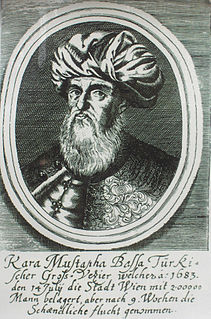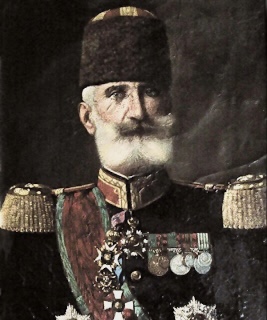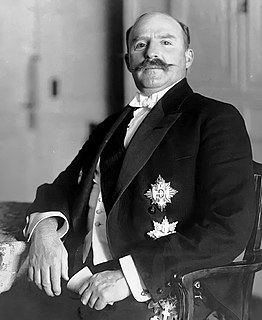 W
WAbdurrahman Abdi Pasha the Albanian was an Ottoman politician and military leader of Albanian descent, who served as the last governor of the province of Budin.
 W
WAhmed Izzet Pasha, known as Ahmet İzzet Furgaç after the Turkish Surname Law of 1934, was an Ottoman general during World War I. He was also one of the last Grand Viziers of the Ottoman Empire and its last Minister of Foreign Affairs.
 W
WAli Pasha, variously referred to as of Tepelena or of Janina/Yannina/Ioannina, or the Lion of Yannina, was an Ottoman Albanian ruler who served as pasha of a large part of western Rumelia, the Ottoman Empire's European territories, which was referred to as the Pashalik of Yanina. His court was in Ioannina, and the territory he governed incorporated most of Epirus and the western parts of Thessaly and Greek Macedonia. Ali had three sons: Muhtar Pasha, who served in the 1809 war against the Russians, Veli Pasha, who became Pasha of the Morea Eyalet and Salih Pasha, governor of Vlore.
 W
WAli Pasha Shabanagaj, was an Albanian military commander and one of the leaders of the League of Prizren. He governed, as an Ottoman kaymakam (sub-governor), an area in what is today eastern Montenegro around Plav and Gusinje. He was commonly known as Ali Pasha of Gusinje. He was the leader of the Albanian irregular troops of the League of Prizren against the Principality of Montenegro at the Battle of Novšiće.
 W
WAmcazade Köprülü Hüseyin Pasha (1644–1702) of the Köprülü family, was the grand vizier of the Ottoman Empire under Mustafa II from September 1697 until September 1702. Amcazade Koprulu Huseyin Pasha was close to ordinary Ottoman Muslim subjects being a member of the Mevlevi Order. He was known to be concerned with the needs of the common people as well as those of the military and bureaucratic classes.
 W
WKara Mahmud Pasha was a hereditary Ottoman Albanian governor (mutasarrıf) of the Pashalik of Scutari and de jure ruler of Albania, belonging to the Ottoman Albanian Bushati family.
 W
WMehmet Pashë Deralla was an Ottoman Albanian military officer and civil servant, and one of the delegates of the Albanian Declaration of Independence. Derralla served as Minister of War in the Provisional Government of Albania. He was a major figure of anti-Ottoman uprisings, and also opposed Serbian and Montenegrin encroachments.
 W
WAbedin bey Dino, also Abedin Pasha was an Albanian patriot, politician, ideologue and diplomat. As a rilindas involved in the Albanian National Awakening, he was one of the founders of the League of Prizren and its chief representative for Epirus (1878). Dino was one of the main promoters in the need for the creation of the Autonomous Albanian Vilayet under the Ottoman suzerainty, and later a contributor in the Albanian independence.
 W
WBib Doda Pasha (1820–1868) was the ruler of Mirdita. He held the Ottoman rank of kapedan (captain) and the honorific pasha (governor).
 W
WAqif Pasha Biçaku mostly known as Aqif Pashë Elbasani was an Ottoman Albanian political figure in the Sanjak of Elbasan and after the Young Turk Revolution became an activist for the Albanian national cause.
 W
WKöprülüzade Fazıl Ahmed Pasha was an Ottoman nobleman and statesman, who was a member of the renowned Köprülü family of Albanian origin, which produced six grand viziers of the Ottoman Empire.
 W
WKöprülü Mehmed Pasha was the founder of the Köprülü political dynasty of the Ottoman Empire, a family of viziers, warriors, and statesmen who dominated the administration of the Ottoman Empire during the last half of the 17th century, an era known as the Köprülü era. He helped rebuild the power of the empire by rooting out corruption and reorganizing the Ottoman army. As he introduced these changes, Köprülü also expanded the borders of the empire, defeating the Cossacks, the Hungarians, and most impressively, the Venetians. Köprülü's effectiveness was matched by his reputation.
 W
WLütfi Pasha was an Ottoman Albanian statesman, general, and Grand Vizier of the Ottoman Empire under Suleiman the Magnificent from 1539 to 1541.
 W
WMehmed Ferid Pasha was an Ottoman statesman. He served as Grand Vizier of the Ottoman Empire from 15 January 1903 until 22 July 1908, at the time when the Sultan restored the 1876 Constitution following the Young Turk Revolution. Other than Ottoman Turkish he spoke the Albanian, Arabic, French, Italian, and Greek languages.
 W
WMehmet Akif Pasha (1822–1893), also known as Arnavut Mehmet Akif Pasha and Kalkandereli Mehmet Akif Pasha, was an Ottoman-Albanian statesman and governor of the Ottoman Empire.
 W
WMerzifonlu Kara Mustafa Pasha was an Ottoman nobleman, military figure and Grand Vizier of Albanian origin, who was a central character in the Ottoman Empire's last attempts at expansion into both Central and Eastern Europe.
 W
WReshid Akif Pasha, was an Ottoman statesman during the last decades of the Ottoman Empire. Throughout his career as a politician, Reshid Akif Paşa served as governor, minister of the interior, and in the Council of State. He is also noted for providing important testimony in the aftermath of the Armenian genocide.
 W
WAlemdar Mustafa Pasha was an Ottoman military commander and a Grand Vizier born in Khotyn in then Ottoman territory Ukraine in 1765. He was of Tosk Albanian origin, from the village of Goskovë near Korçë. Both alemdar and bayraktar mean "the standard bearer" and were the names given to the same rank in the Janissary corps. Alemdar Mustafa Pasha is often regarded as one of the pioneering public figures, who recognized the need of a modern army, as he was instrumental in setting up the French military mission in 1796.
 W
WRexhep Pasha Mati was an Ottoman-Albanian Marshal, governor and war minister.
 W
WŞemsi Ahmet Pasha also known as Chamsi-Pasha; was a prominent Ottoman statesman of Albanian origin who occupied numerous high-ranking political posts, serving at different stages as the Ottoman governor of Damascus, Rûm, Sivas, Anatolia and Rumelia, and subsequently succeeding Sokollu Mehmet Pasha as grand vizier of the Ottoman Empire in 1579.
 W
WShemsi Pasha (1846-1908) was an Ottoman-Albanian General.
 W
WKoca Sinan Pasha was an Albanian Ottoman Grand Vizier, military figure, and statesman. From 1580 until his death he served five times as Grand Vizier. In 1594, he ordered the burning of Saint Sava's remains on the Vračar plateau.
 W
WSulejman Pasha Bargjini was an ethnic Albanian general, nobleman and Governor of the Ottoman Empire. He was originally from Bargjin, but he settled in the village of Mullet, Albania and probably served as a Janissary, he was given the title Pasha. As an ethnic Albanian, he had fought for the Ottomans against the Safavids in Persia. After that he had built a mosque, a bakery and a hammam. He founded the settlement of Tirana, now the capital of Albania, in 1614 as an oriental-style town of those times. According to some local legends, he named the town he founded after Tehran, the capital of Persia. With Suleymans foundations, Tirana soon became the center of Albanian art, culture and religion, it became famous because of its strategic position at the heart of Albania.
 W
WHasan Tahsin Pasha (1845–1918) was a senior Ottoman military officer, who served in the Greco-Turkish War of 1897, and in the First Balkan War.
 W
WEssad Pasha Toptani or Esad Pasha Toptani, mainly known as Essad Pasha, was an Ottoman army officer who served as the Albanian deputy in the Ottoman Parliament. He was a prominent politician in early 20th-century Albania. Toptani cooperated with the Balkan League after the Balkan Wars and established a state in central Albania, based in Durrës, called the Republic of Central Albania.
 W
WPashko Vasa, known as Vaso Pasha or Wassa Pasha, was an Ottoman Albanian writer, poet and publicist of the Albanian National Awakening, and mutasarrif of Mount Lebanon Mutasarrifate from 1882 until his death.
 W
WAziz Pasha Vrioni (1859–1919) was an Ottoman-Albanian politician of the early 20th century. He was a member of the Ottoman Parliament representing Berat, and Albanian Minister of Finance and Minister of Agriculture and of Mines.
 W
WXhelal Pasha Zogolli was hereditary governor of Mati, father of Xhemal Pasha Zogu and grandfather of King Zog I.
 W
WXhemal Pasha Zogu, also known as Jamal Pasha or Jamal Pasha Zogolli, was the Hereditary Governor of Mati, Albania. He was the father of King Zog I of Albania.